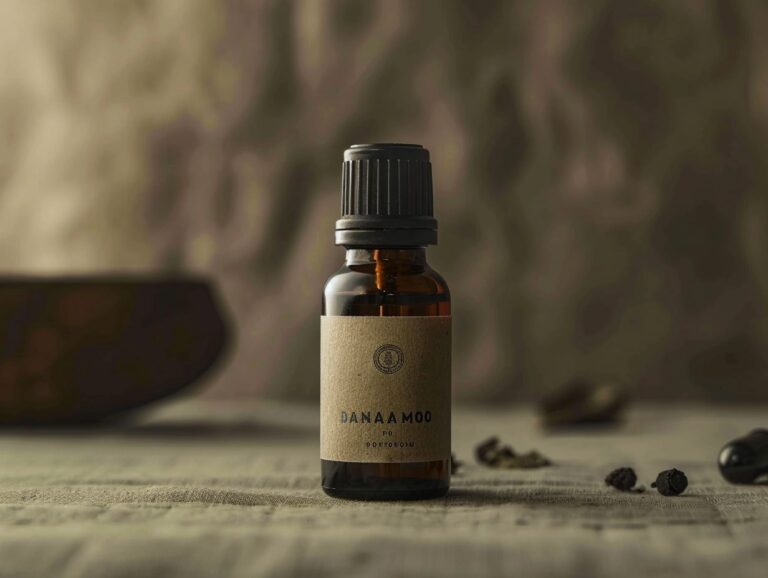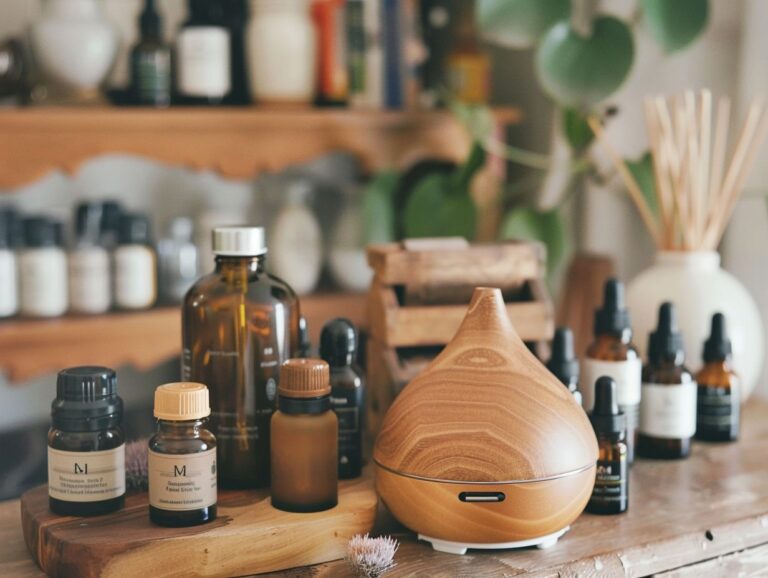Are Essential Oils Safe for Plants
Essential oils have gained popularity not only for their use in aromatherapy and personal care, but also for their potential benefits in plant care. Are essential oils safe for plants?
We will explore the main components of essential oils, how they can be used for plants, the potential risks and benefits, the best essential oils for plant care, how they can be used to treat pests and diseases, alternatives to essential oils, and how to use them responsibly. Are essential oils safe for skin?
Learn more about incorporating essential oils into your plant care routine.
Key Takeaways:
What Are Essential Oils?
Essential oils are highly concentrated compounds extracted from plants that capture the plant’s scent and flavor or ‘essence.’ These oils are often used in aromatherapy, beauty products, and even for medicinal purposes.
Extracting essential oils involves various methods such as distillation, cold pressing, or solvent extraction, depending on the plant material used. For example, steam distillation is a common technique where steam carries the essential oil from the plant material, which is then condensed to obtain the oil. These oils find diverse applications across industries ranging from skincare, haircare, and perfumery to food flavoring and natural cleaning products.
What Are the Main Components of Essential Oils?
The main components of essential oils are volatile aromatic compounds that provide plants with their characteristic scents and flavors. These compounds are derived from different parts of plants such as flowers, leaves, stems, and roots.
Regarding the specific types of volatile compounds found in essential oils, they vary greatly depending on the plant species. For example, a popular compound found in lavender essential oil is linalool, known for its calming properties, while citrus oils contain limonene which is energizing. These compounds are believed to offer a wide array of benefits, from soothing inflammation to improving mood.
The beauty of essential oils lies in the diverse plant sources that can be used for extraction. From the exotic flowers of ylang-ylang to the earthy roots of vetiver, each plant brings its unique blend of volatile compounds, making essential oils a fascinating field of study for botanists and aromatherapists alike.
How Are Essential Oils Used for Plants?
Essential oils can be used for plants to promote growth, repel pests, and even attract beneficial pollinators. These oils offer a natural and effective way to support plant health and vitality.
Regarding enhancing growth, certain essential oils like lavender, peppermint, or tea tree oil can stimulate plant development and increase their resilience against environmental stressors.
For repelling pests, oils such as citronella, eucalyptus, or neem oil can act as natural insect deterrents, protecting plants without harsh chemicals.
Specific oils like lemongrass, geranium, or basil oil can attract bees, butterflies, and other pollinators, ensuring efficient pollination for better yield and biodiversity in your garden.
What Are the Different Methods of Applying Essential Oils to Plants?
There are several methods for applying essential oils to plants, including diluting them in water for spraying, using them in oil diffusers near plants, or incorporating them into plant food for systemic benefits.
Using a water-based spray is one of the most common ways to apply essential oils to plants. This method allows for a broad application and easy absorption by the plant. On the other hand, diffusing oils near plants can create a gentle and continuous release of the essential oil molecules, promoting overall plant wellness. Incorporating oils into plant food ensures that the plants receive a consistent dose of the beneficial properties, supporting their growth and resilience.
Are Essential Oils Safe for Plants?

Essential oils are generally safe for plants when used in the correct dilution and application methods. Some oils can be potent and may harm certain plant species, so it’s essential to research and use them carefully.
When using essential oils on plants, consider factors like the plant’s species, age, health condition, and environmental conditions. Some plants may be more sensitive or receptive to certain oils than others. Always start with a small test area before applying safe essential oils for skin widely.
Research the specific essential oils you plan to use and their effects on plants. Some oils may have pesticidal properties that could harm beneficial insects or pollinators.
What Are the Potential Risks of Using Essential Oils on Plants?
While essential oils can offer numerous benefits to plants, there are potential risks involved, such as oil toxicity, leaf burn, or interference with natural plant processes. It’s crucial to be aware of these risks to avoid unintended harm to plants.
Oil toxicity can occur when essential oils are applied in high concentrations, leading to plant stress or even death. Leaf burn, on the other hand, may result from using certain oils that are too potent for the plant species, causing damage to the leaves.
Essential oils can sometimes disrupt the normal metabolic pathways of plants, affecting their growth and development negatively. To mitigate these risks, it is recommended to dilute the essential oils properly before application, conduct a patch test on a small area of the plant, and monitor the plant’s reaction closely.
Do Essential Oils Have Any Benefits for Plants?
Essential oils offer a range of benefits for plants, including pest repellent properties, enhanced growth stimulation, and the attraction of beneficial insects for pollination. Certain oils can support plant immunity and overall health.
One key advantage of essential oils is their ability to improve plant resilience against environmental stressors. These oils act as natural protectants, shielding plants from harmful pests and diseases. By boosting the plant’s defense mechanisms, essential oils help in maintaining a healthy and vibrant garden.
- The use of essential oils can promote the growth and development of plants. Oils such as lavender oil and peppermint oil are known for their growth-stimulating properties, encouraging root development and nutrient absorption.
- Essential oils play a crucial role in enhancing ecosystem interactions within the garden. For instance, oils like citronella oil and lemongrass oil attract beneficial insects, such as bees and butterflies, which aid in pollination and promote biodiversity.
What Are the Best Essential Oils for Plant Care?
Some of the best essential oils for plant care include lavender, thyme, lemongrass, cedar, and rosemary. These oils are known for their properties that benefit plant health and can be effective in pest management and growth enhancement.
Each of these essential oils offers unique advantages in plant care.
- Lavender oil is renowned for its calming properties, making it ideal for reducing plant stress and promoting relaxation.
- Thyme oil is a powerful antifungal and antibacterial agent, helping to protect plants from harmful pathogens.
- Lemongrass oil acts as a natural insect repellent, deterring pests without the need for harsh chemicals.
Cedar oil has a woody aroma that can deter insects and provide a protective barrier for plants. Rosemary oil is rich in antioxidants, promoting overall plant health and stimulating growth.
What Are the Properties and Uses of These Essential Oils for Plants?
Lavender essential oil is known for its calming aroma and pest-repelling properties, while thyme oil is a potent antifungal agent. Lemongrass oil can deter insects, cedar oil offers protection against pests, and rosemary oil promotes growth and vitality in plants.
Each of these essential oils comes with unique benefits that can support plant care in various ways.
- Lavender essential oil is not only prized for its soothing scent but it can also help in repelling pests like mosquitoes and flies, making it a valuable addition to your plant care routine.
- Thyme oil, with its antifungal properties, can combat fungal infections that may affect plant health.
- Lemongrass oil, known for its fresh citrusy scent, acts as a natural insect deterrent, keeping pests away from your plants.
Cedar oil, extracted from cedarwood, is a natural insecticide that can provide protection against a wide range of pests, such as moths, ants, and mites. Using cedar oil can help maintain a pest-free environment for your plants, ensuring their growth is not hampered by unwanted visitors.
Rosemary essential oil, on the other hand, is a great stimulant for plant growth and can enhance vitality. It also has natural antioxidant properties that can protect plants from environmental stressors.
How Can Essential Oils Be Used to Treat Plant Pests and Diseases?

When integrated into a comprehensive pest management strategy, essential oils act as powerful botanical agents that repel or deter pests through various mechanisms. One common approach is through disrupting the insects’ pheromone receptors, making it difficult for them to locate their host plants. Some essential oils like neem oil possess insecticidal properties, affecting the pests’ physiological functions and leading to their elimination.
Essential oils can also create a protective barrier around plants, acting as a shield against harmful organisms while promoting the growth of beneficial ones. Citrus oils, for example, are known to have antifungal properties that can combat common plant diseases like powdery mildew or rust.
What Are the Most Effective Essential Oils for Pest and Disease Control?
Tea tree oil is renowned for its insecticidal properties, geranium oil can repel a variety of pests, and peppermint oil is effective against ants and spiders. These essential oils offer potent solutions for controlling pests and safeguarding plant health.
Tea tree oil works by disrupting the nervous system of insects, leading to their demise, while geranium oil emits a scent that deters pests from infesting plants.
On the other hand, the strong aroma of peppermint oil confuses and repels ants and spiders away from the treated areas.
Applying these dangerous essential oils properly is essential for their efficacy in pest control. dilute them in water and spray directly on leaves or soil.
Regular applications help create a protective barrier against pests and diseases, promoting a healthier plant environment.
What Are the Alternatives to Essential Oils for Plant Care?
While essential oils are effective for plant care, several alternatives exist, including neem oil, diatomaceous earth, and beneficial insects. These options offer diverse solutions for pest management, disease control, and overall plant health.
Neem oil, derived from the seeds of the neem tree, is known for its insecticidal properties, effectively targeting pests like aphids, mealybugs, and spider mites. It also acts as a fungicide, combating diseases such as powdery mildew.
Diatomaceous earth, a fine powder made from fossilized algae, is a natural and non-toxic solution. It works by dehydrating insects like ants, cockroaches, and beetles, making it a great option for indoor plant care.
Beneficial insects, such as ladybugs and lacewings, are nature’s own pest control team. They feed on harmful insects, providing sustainable, chemical-free protection for your plants.
What Are the Pros and Cons of These Alternatives?
Neem oil provides broad-spectrum pest control but may have a strong odor, diatomaceous earth offers physical pest deterrent properties, and beneficial insects can establish a natural predator-prey balance in plant ecosystems.
While neem oil is effective against a wide range of pests such as aphids, mites, and caterpillars, its intense smell can be off-putting for some gardeners.
On the other hand, diatomaceous earth works by dehydrating insects upon contact, making it a non-toxic option for pest control.
Beneficial insects like ladybugs and praying mantises are great allies in maintaining an ecological balance in the garden, targeting specific pests without harming beneficial organisms. They offer a sustainable and environmentally friendly approach to pest management, reducing the need for chemical interventions.
How Can Essential Oils Be Used Responsibly for Plant Care?
Using essential oils responsibly for plant care involves diluting oils properly, conducting patch tests on plants, and adhering to recommended application guidelines. It’s crucial to prioritize plant safety and environmental impact when using essential oils.
One fundamental aspect of using essential oils in plant care is the dilution process. Essential oils are highly concentrated substances that can be too strong and potentially harmful if applied undiluted. Diluting essential oils properly involves mixing them with a carrier oil, such as coconut oil or olive oil, to ensure that the potency is reduced to a safe level for plant-based oils.
Testing is another essential step before using toxic essential oils on your plants. Conducting a patch test involves applying a diluted solution of the essential oil on a small part of the plant to check for any adverse reactions. This helps in determining the plant’s sensitivity to the oil and prevents widespread damage.
Regarding application, following recommended guidelines is key. Whether you are using essential oils for pest control, promoting growth, or enhancing fragrance, it’s important to apply them in the right amounts and at the appropriate times to maximize their benefits without causing harm to the plants.
Furthermore, sustainability plays a significant role in incorporating essential oils into plant care routines. Opt for oils that are sourced ethically and consider the environmental impact of their production. Embrace plant-friendly practices that align with eco-conscious gardening, such as composting, recycling, and using organic fertilizers alongside essential oils.
What Are the Precautions and Guidelines for Using Essential Oils on Plants?

Another crucial precaution is to dilute the essential oils properly before applying them to plants, as their concentrated form can be too strong for plant tissues. It’s recommended to mix essential oils with a carrier oil or water to reduce potential risks of plant damage.
Always conduct a patch test on a small area of the plant before widespread application to check for any sensitivity or negative reactions. This step helps in preventing harm to the entire plant due to a possible adverse response to the oil.
Consider the specific needs of each plant species, as different plants may react differently to various essential oils. Research the compatibility of the plant with the oil before using it to ensure the best results and minimize any negative impact on the plant’s health.
Frequently Asked Questions
Are Essential Oils Safe for Plants?
Yes, essential oils can be safe for plants when used properly.
How can I use essential oils on my plants?
Essential oils can be diluted in water and sprayed onto the leaves of plants or added to the soil.
Which essential oils should I avoid using on plants?
Avoid using essential oils with high levels of phenols, such as oregano or thyme, as they can be harmful to plants.
Can essential oils help with plant growth?
Yes, certain essential oils, like peppermint or lemon, can stimulate plant growth and repel pests.
What precautions should I take when using essential oils on plants?
Always dilute essential oils and test a small area of the plant first before using on the entire plant.
Are essential oils safe for all types of plants?
No, some plants may be sensitive to essential oils and can be harmed by their use. Always research the specific plant before using essential oils on it.








8 Comments